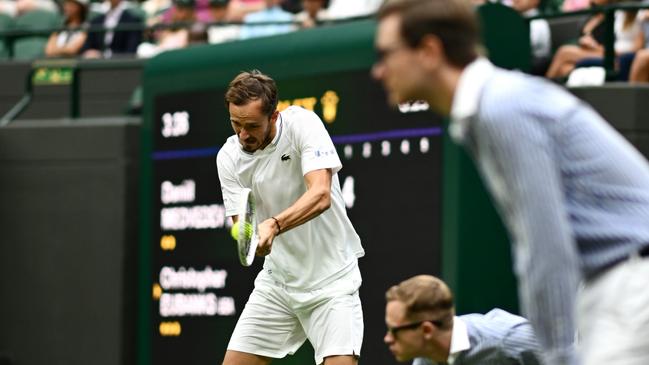Artificial intelligence-based system to replace Wimbledon line judges
Next year’s Wimbledon championships will be the first in the tournament’s history not to feature human line judges, with officials to adopt an AI-based system.

Wimbledon has broken with a tradition dating back 147 years and abolished line judges in favour of artificial intelligence.
Next year’s championships will be the first in the tournament’s history not to feature the uniformed men and women around the edges of courts who shout “fault” and “out”.
Line judges will be replaced by automated electronic line calling systems on all 18 match courts, including Centre Court, at the All England Club.
Organisers said the change would bring “maximum accuracy”, reducing the chance of confrontations such as the infamous “You cannot be serious” tirade by John McEnroe, the three-time champion, in 1981.
There had been some initial reluctance at Wimbledon to end a longstanding tradition by switching to ELC, but organisers have finally come to the conclusion that the high standards of the championships could be compromised by persisting with human line judges. ELC is widely considered a more accurate officiating system, to which the sport’s top players are now well accustomed.
The Hawk-Eye Live system is thoroughly tested on the tennis tour, having first been used at grand slam level during the 2020 US Open in the midst of the Covid-19 pandemic. Since then it has increasingly been adopted at tournaments across the world, with the men’s ATP Tour pledging to install it at all regular events from next year.
This is essentially a wider upgrade of the Hawk-Eye challenge system in use at Wimbledon since 2007. Players were allowed to call for unlimited electronic reviews of disputed calls during a set as long as they had not made three incorrect challenges.
From next year the challenge concept will be ditched, as automated voice calls will be heard within a tenth of a second of the ball landing out. Cameras are used to track the trajectory of the ball during rallies, with a separate video operator overseeing the process from a room off court. The chair umpire will remain the leading official on the court.
The move will be welcomed in the locker room. The players will be so used to the technology by next summer that it would feel like a step back to have line judges standing at the back of the court.
McEnroe, whose catchphrase was born from a dispute over a line call, has previously called for the innovation to be embraced. “If you have equipment that’s accurate, I’m sorry, you have got to go with that,” he said last year. “Maybe I wouldn’t be talking to you now because of the antics and maybe I would have won more, but I would have been more boring.” Wimbledon organisers are understood to have agonised over the line-calling decision. Central to this hesitation was the impact on the many line judges who rank the championships as the pinnacle of the season.
The Australian Open became the first grand slam to be held without line judges, and the US Open followed suit in 2022.
Wimbledon required about 300 line judges aged between 18 and 80 to cover more than 650 matches for two weeks. While a small number of elite line judges travel globally, many of those from the UK who work at Wimbledon consider it a part-time position alongside other lines of work. The rate of pay before expenses ranges from £40 ($78) a day to about £180 at Wimbledon.
Suggestions for alternative positions in tennis have already been mooted. Line judges could be offered the opportunity to retrain as off-court officials.
The Association of British Tennis Officials said it was “working with the Lawn Tennis Association. Our shared aim is to adapt to these changes by having an appropriate pathway and support system in place to ensure that we can continue to attract and retain officials within the sport”.
THE TIMES



To join the conversation, please log in. Don't have an account? Register
Join the conversation, you are commenting as Logout